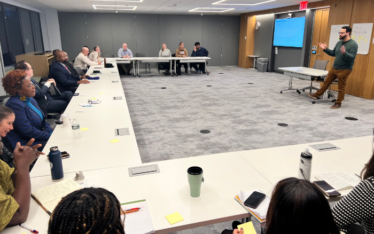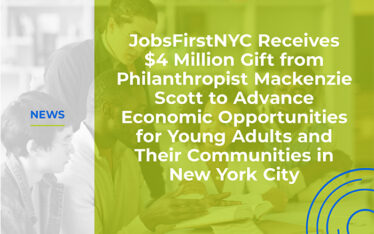Good afternoon Chairperson Debi Rose, Chairperson Margaret Chin, Chairperson Ben
Kallos and distinguished members of the Youth Services, Aging, and Contracts
committees. My name is Marjorie Parker and I am the President and CEO of
JobsFirstNYC, a non-profit intermediary that creates and advances solutions that break
down barriers and transform the systems supporting young adults and their
communities in the pursuit of economic opportunities.
According to a recent analysis from NYC Comptroller Scott Stringer, the unemployment
rate in May 2020 among young people, ages 16 to 24, has skyrocketed during the
pandemic, rising to 35.2% from its pre-pandemic rate of 6.6%. In contrast, the
unemployment rate among workers 55 and older rose from a pre-pandemic rate of 3.1%
to 14.1%, 5.8 percentage points lower than the overall City’s rate. For young adults, a
recession can have much longer-lasting consequences.
For example, young adults have more difficulty than usual entering the workforce or maintaining a job held at the onset of a recession. Extended delay in employment can reduce asset accumulation over their lifetimes. And young adults today may be even harder hit than in previous generations, because they carry more student loan debt, on average, than previous
generations of young adults. This reality requires all of the city’s resources to ensure
that another generation is not left behind.
To understand the breadth of the pandemic’s economic impact on young adults, their
communities, and the organizations that support them, JobsFirstNYC conducted
interviews with leaders from 68 of our partner institutions. The resulting report, called
The Early Impact of COVID-19 on Young Adult Workforce Development: Insights from
the Field, shares the insights we collected, articulates emerging questions that the
young adult workforce development field is now grappling with and offers
recommendations to ensure that young adults and their communities are not left behind.
You can read the report on our website www.jobsfirstnyc.org or click this link:
The Early Impact of COVID-19 on Young Adult Workforce Development: Insights from the Field.
However, before sharing our key findings and recommendations for the City Council,
JobsFirstNYC must share its disappointment and concern by the lack of leadership
from the city to invest in New York City’s out-of-school and out-of-work population. The
New York City Council passed a Resolution that was enacted on April 25, 2017, which
charged Mayor De Blasio to launch a NYC Disconnected Youth Task Force that would
work to develop a single-system strategy with real investment to address the full needs
of our city’s most vulnerable and left behind young adults. A first report, which has not
come, was due to the City Council on March 1, 2018. We again call on your leadership
to advocate for the needs of young adults who lack a champion and need access to
education, post-secondary training, and employment opportunities now more than ever.
Despite the urgent need for immediate action to get through the COVID-19 storm, the
workforce development community must also focus on developing a coherent long-term
vision for preparing young adults to fully participate in the civic and economic life of New
York City. Young adults, the nonprofits that serve them, and the businesses that employ
they are facing unprecedented challenges.
Our latest report found the following 7 Insights that should inform the City Council’s approach:
1. Household finances are declining rapidly as COVID-19 exacerbates preexisting
inequalities in the areas of food, housing, health, and financial insecurity.
2. Having a job has become a matter of life and death, not just employment.
3. The pandemic is causing young adults to face greater competition for jobs,
internships, and work-based learning experiences.
4. Young adults and nonprofit staff are facing rising mental and physical health needs.
5. The transition to remote teaching and learning is not meeting all of the needs of
young adults and will negatively affect their skills training and educational progress.
6. Funding is flexible right now, but nonprofits are bracing for drastic public funding
cuts.
7. The future of the labor market is uncertain, leaving workforce providers and
jobseekers without a roadmap.
To address the issues unfolding in communities across New York City and leaving
many young adults behind, the New York City Council should consider the following
recommendations:
1. Hold the line on cutting funding for critical programs and convert current
funding to general operating support for at least the next year. Nonprofits are
using existing resources to provide emergency funds that they have not budgeted
for, all the while facing reduced philanthropic funding and looming budget cuts. To
maintain these emergency services alongside current programming efforts, funders
must convert program-specific funding into general operating support. This will
ensure that nonprofits not only survive this crisis but can nimbly respond to the
emerging needs in communities that are unraveling in real-time.
2. Create opportunities for the workforce development field to rightsize its
organizations. Resources are dwindling as the needs of organizations and the
young adults they serve are increasing. Organizations have transitioned to remote
programming and undergone major shifts in program design, structural operation,
and the use of technology. It is critical that funders support these changes with
increased funding, loosened accountability metrics, and flexible protocols that allow
organizations to restructure service delivery in a way that is best suited for their
communities in a post- COVID-19 landscape.
3. Invest in mental health counseling and support services. Nonprofit staff and the
communities they serve are experiencing trauma in response to the COVID-19
pandemic and will require mental health counseling and other social-emotional
support in the near future. Government should invest in mental health counseling to
ensure that anyone experiencing trauma—including young adults, nonprofit staff,
and community members—have access to free services.
4. Invest in institutional partnerships between the workforce and educational
systems. In light of limited resources and growing needs in low-income
communities, partnerships between educational institutions and workforce
development providers create localized solutions that respond to the unique needs
of young adults and the communities where they live. Funders should incentivize
these institutional collaborations so that they are able to innovate in response to the
current crisis and to lay the foundation for an equitable post- COVID-19 landscape.
Neighborhoods with high numbers of out-of-school, out-of-work young adults can
especially benefit from institutional partnerships. Place-based solutions, such as
Youth WINS, a Staten Island-based JobsFirstNYC partnership initiative, are
effective in building institutional capacity and producing better outcomes for their
target constituents.
5. Map in-demand skills and partner with employers to develop new strategies to
improve educational and training programs for young adults. Understanding the
talent needs of industries will be key to redesigning and implementing effective skills
training programs and related industry-specific credentials. This understanding
comes from strong relationships with employers and from comprehensive knowledge
of the skills needed in high- growth areas of the economy, as well as labor market
data and trends. Workforce development organizations should design initiatives
focused on sectoral employment (such as JobsFirstNYC’s Young Adult Sectoral
Employment Project), and should embark on strategies that map and match skills
across sectors to improve young adults’ employment opportunities.
Ultimately, any COVID-19 economic relief strategy must take a hyperlocal approach in
the neighborhoods most affected, ensure that mechanisms are in place to connect local
residents of these neighborhoods to any jobs created, and support the city’s smallest businesses to gain the knowledge and resources they need to access government-
sponsored economic recovery programs. Without these three elements, relief efforts will leave behind those who have suffered the most from this pandemic.
Thank you for your time and consideration. We appreciate the opportunity to testify and
look forward to working with each of you to advocate for progress through the NYC
Disconnected Youth Task Force, enact these recommendations, and ensure that all
New Yorkers benefit from the City’s COVID-19 relief efforts.





